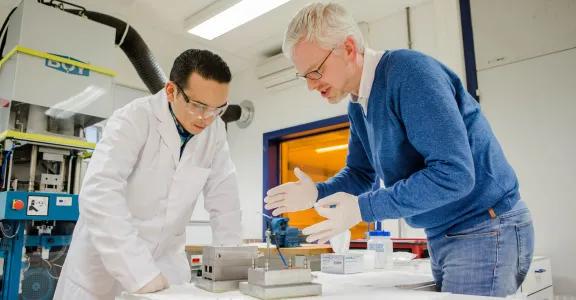
Hands-on masterclass micromanufacturing
Why micromanufacturing?
“Maximising the outputs while minimising the inputs”
Micromanufacturing greatly expands the horizons of manufacturers, SMEs and start-ups in their development of new miniaturised products, taking them into the world of millimetric to micrometric dimensions that offer a substantial competitive advantage.
The main areas of development using micromanufacturing include :
- production of very small optical, mechanical and fluidic parts,
- miniaturization of complex devices for greater robustness, reliability and ease of use,
- minimally invasive addition of smart functionalities (detection, communication, automation) to "macro" products or processes (smartisation).
Moreover, micromanufacturing is a key enabling technology that can facilitate the development of new, more sustainable products. Indeed, all miniaturized products require fewer resources to manufacture (less raw materials), to transport and to store (reduced weight and volume). Their production and recycling are also likely to generate less waste.
For all these reasons, micromanufacturing is worth considering for any hardware device development.
What is micromanufacturing ?
Let's start by describing what micromanufacturing is not. Actually, we will not go into microfabrication techniques such as silicon-based processes mostly used in micro-electronics and MEMS industry, such as photolithography, etching, CMOS processes. Nor will we investigate strategies for microproduction, manufacturing of products in small quantities and/or using small manufacturing facilities.
This masterclass aims to cover techniques and strategies for the manufacture of products and/or features that have at least one functional detail in the submillimetric down to micrometric range.
Polymeric and metallic materials, which make up the vast majority of manufactured products, will be at the heart of our exploration.
Micromanufacturing includes subtractive (shaping by removing material from a blank substrate), additive (creating or functionalizing objects by selective micro-deposition of material) and replicative (producing replicas from a mould) approaches, not forgetting micro-assembly methods, which are increasingly critical in today's sustainability context.
What will you learn in this masterclass?
The masterclass is intended to immerse you in the leading micromanufacturing techniques, including those available in the Sirris Micro Lab, and more specifically:
- subtractive approaches: micro-milling, micro-wire EDM, 3D micro-EDM milling,
- replication methods: injection moulding, ultrasonic replication,
- additive techniques: screen and ink-jet printing, micro-stereolithography, multiphoton polymerisation.
Examples of assembly techniques (bonding, ultrasonic welding, pick and place) and metrology will also be presented.
Theoretical learning and practical demonstrations in the field will alternate to enable you, thanks to total immersion, to better understand the specificities, constraints and advantages of micromanufacturing for your developments.
Programme
(preliminary)
|
09:00 |
Welcome |
|
09:15 |
Introduction - Micromanufacturing & applications |
|
10:00 |
Subtractive Techniques (theory) |
|
11:00 |
Subtractive techniques (labo) |
|
12:00 |
Additive techniques (theory) |
|
12:45 |
Lunch |
|
13:30 |
Replication techniques (theory) |
|
14:00 |
Additive techniques (labo) |
|
15:00 |
Replication Techniques (labo) |
|
15:30 |
Integration and assembly (labo) |
|
16:00 |
Metrology (labo) |
|
16:30 |
Wrap-up, conclusions Q&A and open discussion |
|
17:00 |
End of the day |
Price
Thanks to the support of VLAIO within the framework of the #industrypartnership project, companies located in Flanders pay only 375 euros. The participation fee for this masterclass is 1,250 euros for companies outside of Flanders.


